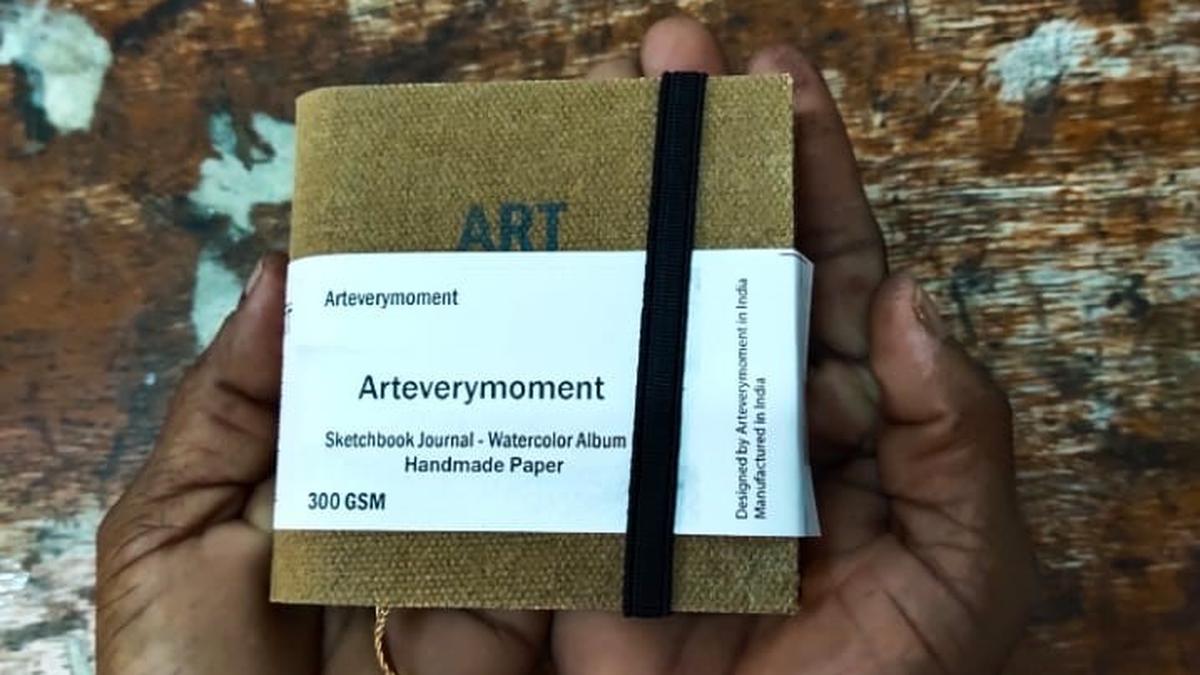
Local women power Kerala artist’s premium handmade sketchbook brand
The Hindu
Cherthala artist Kajal Deth creates handmade sketchbooks using premium paper, catering to artists and designers nationwide.
Cherthala-based artist Kajal Deth says the kind of paper an artist uses is an important component for their creative expression. “The paper does half the work…it should respond when you draw on it.” Locally available paper, most imported from China, did not ‘respond’ as she wanted so she decided to make her own sketchbooks. And that is how handmade Art Every Moment sketchbooks came to be.
“As artists, sketching is a part of our practice, in fact it is fundamental to art. The paper we use is important. Smooth paper will not do. For instance it plays a role in how the colour translates…things that are important to artists,” says Kajal over the phone. A student of painting from the RLV College of Music and Fine Arts, Kajal, 38, has been part of solo and group shows in Kerala and outside. She also has a studio space at Jew Town, Mattancherry.
She was toying with the idea of making sketchbooks for herself when she heard of Asha, a woman in her neighbourhood, at Cherthala, near Alappuzha, an expert in binding books. Initially she made the books for herself and gave her friends a few. Buoyed by their response, she got down to making the books. Asha trained four other women, and Art Every Moment was on its way in 2019. She started selling at Lokame Tharavadu (2021), the two-month art extravaganza put together by the Kochi Biennale Foundation.
It was, however, the space at the Biennale Kada (shop), the souvenir store at the Kochi Biennale 2022, that served as an introduction to a customer base from across the country of artists, designers, architects and even celebrities such as Lisa Ray.
“It is intended as a sketchbook, you can sketch, draw using charcoal and watercolours too. Some people use it for journaling too,” Kajal says. She uses different kinds of cotton, handmade paper for the books of varying GSM and sizes — from palm size to the much in demand A4 and A5. GSM stands for grams per square metre, higher the number grams the better the paper.
The prices of the sketchbooks/journals/watercolour pads range from ₹50 to ₹3500. The cutting is perhaps the only mechanised process, “The rest of it is all made by hand. The cover is canvas, the inside pocket and elastic closure are all hand-attached. A lot of effort goes into each product, the specs are premium. Initially the design lacked perfection, it has now been refined.”
“I source cotton, handmade paper from India, of course. From where, I will not tell you because it is a trade secret. The cutting is outsourced locally, and the binding is done by the five women.” The work is not regular, mostly driven by orders and demand.

“Writing, in general, is a very solitary process,” says Yauvanika Chopra, Associate Director at The New India Foundation (NIF), which, earlier this year, announced the 12th edition of its NIF Book Fellowships for research and scholarship about Indian history after Independence. While authors, in general, are built for it, it can still get very lonely, says Chopra, pointing out that the fellowship’s community support is as valuable as the monetary benefits it offers. “There is a solid community of NIF fellows, trustees, language experts, jury members, all of whom are incredibly competent,” she says. “They really help make authors feel supported from manuscript to publication, so you never feel like you’re struggling through isolation.”

Several principals of government and private schools in Delhi on Tuesday said the Directorate of Education (DoE) circular from a day earlier, directing schools to conduct classes in ‘hybrid’ mode, had caused confusion regarding day-to-day operations as they did not know how many students would return to school from Wednesday and how would teachers instruct in two modes — online and in person — at once. The DoE circular on Monday had also stated that the option to “exercise online mode of education, wherever available, shall vest with the students and their guardians”. Several schoolteachers also expressed confusion regarding the DoE order. A government schoolteacher said he was unsure of how to cope with the resumption of physical classes, given that the order directing government offices to ensure that 50% of the employees work from home is still in place. On Monday, the Commission for Air Quality Management in the National Capital Region and Adjoining Areas (CAQM) had, on the orders of the Supreme Court, directed schools in Delhi-NCR to shift classes to the hybrid mode, following which the DoE had issued the circular. The court had urged the Centre’s pollution watchdog to consider restarting physical classes due to many students missing out on the mid-day meals and lacking the necessary means to attend classes online. The CAQM had, on November 20, asked schools in Delhi-NCR to shift to the online mode of teaching.









